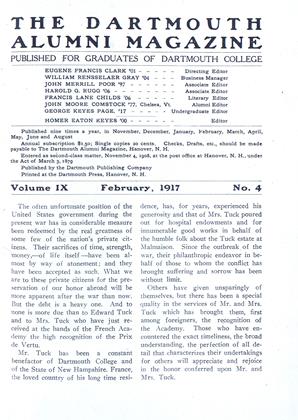Much interest has been aroused in the. city of Boston and among Dartmouth alumni wherever located by announcement that Edward K. Wall, Dartmouth '92 and a trustee of the College has resigned his vice-presidency ot the New England Telephone and Telegraph Company and will remove to New York where he is to become one of the vice-presidents of the Electric Bond and Share Company.
This Company, which is closely associated with the forces controlling the General Electric Company,_ is extensively interested in public utility properties in various parts of the United States. Since now-a-days public ulilities imply right public relations the Electric Bond and Share Company has been seeking a man capable of assuming unity of purpose in the efforts of its various subsidiary companies, to give to the public and to obtain from it completely fair treatment. Mr. Hall is the man who has been chosen for the jtask.
Graduated from Dartmouth m 1892 and from the Harvard Law School in 1896 Mr. Hall became associated with Mr Samuel L. Powers as counsel for the New England Telephone and Telegraph Company. His honesty, broadmindedness and willingness to help, combined with quick sympathy and a genius good fellowship brought him more and more into prominence as representative of the Company before Legislative Commissions, and various others public bodies; as well as in dealings between the Company and its employees with whom his popularity has become proverbial.
The natural development of his work in these directions led to a vice-presidency in the telephone company where he has built up an important and highly efficient organization, and with it a reputation which led to an offer too flattering to be resisted.
Mr. Hall's connection with Dartmouth affairs is too well known to require review He has been an enthusiastic and successful leader in virtually every alumni enterprise of recent years. today he is serving his first term as alunjm trustee. The range of his Boston, interests is shown by his affiliations with numerous organizations among them the Brae-Burn Country Club, Newton Club, Exchange Club, Boston City Club, Tennis and Racquet, Traffic Club of New England, Boston Press Club, Boston and Middlesex Bar Associations, Dartmouth Club of Boston, Massachusetts Republican Club and First Corps Cadets.
Something of the esteem in which he is held is shown in an editorial in the Andover, (Mass..) Townsman which under the caption "Distinct Loss to Public Service" has this to say:
"The resignation of Edward K. Hall as vice-president of the New England Telephone and Telegraph Company to take up a bigger and more lucrative position in New York City means a distinct loss to the business life of Boston, Massachusetts, and New England, and a loss much greater to that form of public service which he has so distinctly elevated, through his activities of the. past few years.
"Mr. Hall had long been closely associated with telephone matters as a member of a prominent law firm directing the legal affairs of the telephone company previous to his elevation to an important vice-presidency, and that office was a natural promotion. When he came into his more active work, however, as director of the activities of the telephone company in which State Legislatures, law-makers, and all sorts of officials were involved, he began to work out the problems of the relation of these interests to a public service corporation along new lines, and in a way that had an almost immediate effect upon the attitude of the public toward the telephone company. It wasn't that Mr. Hall was a rare diplomat, although he was. that; it wasn't that he had any particular panacea original and copyrighted by. himself: it wasn't because of any one pronounced individual attribute, but it was because he aoplied rare judgment, clear common sense, and complete frankness to the problem in hand.
"The Telephone Company stands better today with agencies that ought to be working with it, than ever in its history because Edward K. Hall as a vice-president of the company has succeeded in making the official life of New England recognize the rights of his company, and because he has jinsisted that his company should give equal recognition to the authority of official New England when honestly exercised.
"There will be many men in New England who will also feel a distinct personal loss .because of Mr. Hall's going, but all will wish for him the biggest possible measure of success in his new field of activities."
 View Full Issue
View Full Issue
More From This Issue
-
 Article
ArticleTHE SCHOOL AND COLLEGE LIFE OF JUDAH DANA OF THE CLASS OF 1795
February 1917 By James A. Spalding '66 -
 Books
BooksThe New Reservation of Time
February 1917 By HENRY T. MOORE -
 Class Notes
Class NotesCLASS OF 1916
February 1917 By Richard Parkhurst -
 Article
ArticleThe often unfortunate position of the United States government
February 1917 -
 Class Notes
Class NotesCHICAGO ASSOCIATION
February 1917 By T.T. REDINGTON '07, CHARLES R. WEBSTER '82, CHANCELLOR L. JENKS '861 more ... -
 Article
ArticleVARSITY BASKETBALL
February 1917








